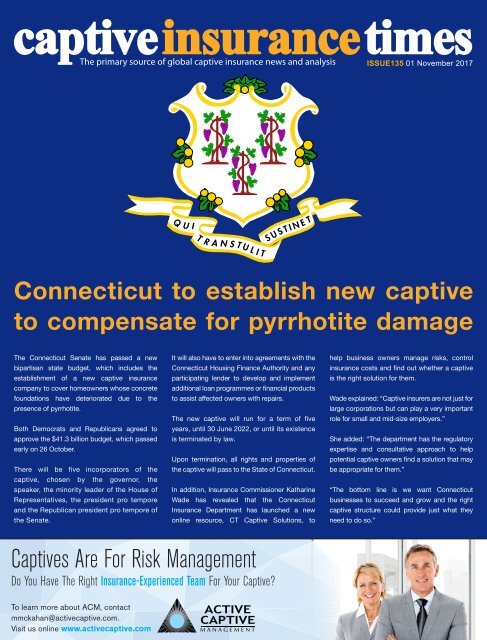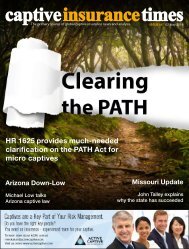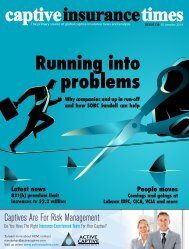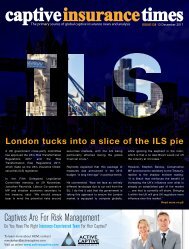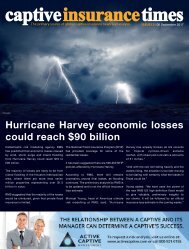Captive Insurance Times issue 135
In this issue of Captive Insurance Times, find out what happened at this year’s Guernsey Insurance Forum. The event, held in London, concentrated on how the insurance industry is innovating and evolving in response to global trends and challenges. In other news, Sun Life and Pareto have teamed up to establish a new stop-loss group captive solution, Legend Re. Don't forget to visit www.captiveinsurancetimes.com to read the latest news, scan the most recent issues, or check out upcoming events. Conference Report: Attendees of the Guernsey Insurance Forum heard how important it is for different parts of the industry to work together not only to co-exist, but also to collaborate Medical Captives: Michael Schroeder of Roundstone explains why transparency, control and cost savings are the secret sauce offered by a medical captive Industry Appointments: Comings and goings at Innovative Captive Strategies, Centaur Fund Services, DARAG and more
In this issue of Captive Insurance Times, find out what happened at this year’s Guernsey Insurance Forum.
The event, held in London, concentrated on how the insurance industry is innovating and evolving in response to global trends and challenges.
In other news, Sun Life and Pareto have teamed up to establish a new stop-loss group captive solution, Legend Re.
Don't forget to visit www.captiveinsurancetimes.com to read the latest news, scan the most recent issues, or check out upcoming events.
Conference Report: Attendees of the Guernsey Insurance Forum heard how important it is for different parts of the industry to work together not only to co-exist, but also to collaborate
Medical Captives: Michael Schroeder of Roundstone explains why transparency, control and cost savings are the secret sauce offered by a medical captive
Industry Appointments: Comings and goings at Innovative Captive Strategies, Centaur Fund Services, DARAG and more
Create successful ePaper yourself
Turn your PDF publications into a flip-book with our unique Google optimized e-Paper software.
ISSUE<strong>135</strong> 01 November 2017<br />
Connecticut to establish new captive<br />
to compensate for pyrrhotite damage<br />
The Connecticut Senate has passed a new<br />
bipartisan state budget, which includes the<br />
establishment of a new captive insurance<br />
company to cover homeowners whose concrete<br />
foundations have deteriorated due to the<br />
presence of pyrrhotite.<br />
Both Democrats and Republicans agreed to<br />
approve the $41.3 billion budget, which passed<br />
early on 26 October.<br />
There will be five incorporators of the<br />
captive, chosen by the governor, the<br />
speaker, the minority leader of the House of<br />
Representatives, the president pro tempore<br />
and the Republican president pro tempore of<br />
the Senate.<br />
It will also have to enter into agreements with the<br />
Connecticut Housing Finance Authority and any<br />
participating lender to develop and implement<br />
additional loan programmes or financial products<br />
to assist affected owners with repairs.<br />
The new captive will run for a term of five<br />
years, until 30 June 2022, or until its existence<br />
is terminated by law.<br />
Upon termination, all rights and properties of<br />
the captive will pass to the State of Connecticut.<br />
In addition, <strong>Insurance</strong> Commissioner Katharine<br />
Wade has revealed that the Connecticut<br />
<strong>Insurance</strong> Department has launched a new<br />
online resource, CT <strong>Captive</strong> Solutions, to<br />
help business owners manage risks, control<br />
insurance costs and find out whether a captive<br />
is the right solution for them.<br />
Wade explained: “<strong>Captive</strong> insurers are not just for<br />
large corporations but can play a very important<br />
role for small and mid-size employers.”<br />
She added: “The department has the regulatory<br />
expertise and consultative approach to help<br />
potential captive owners find a solution that may<br />
be appropriate for them.”<br />
“The bottom line is we want Connecticut<br />
businesses to succeed and grow and the right<br />
captive structure could provide just what they<br />
need to do so.”<br />
<strong>Captive</strong>s Are For Risk Management<br />
Do You Have The Right <strong>Insurance</strong>-Experienced Team For Your <strong>Captive</strong>?<br />
To learn more about ACM, contact<br />
mmckahan@activecaptive.com.<br />
Visit us online www.activecaptive.com
News Round-Up<br />
Sun Life and Pareto launch stoploss<br />
group captive<br />
Sun Life and Pareto <strong>Captive</strong> Services have<br />
team up to establish a new stop-loss group<br />
captive solution, Legend Re.<br />
Inside<br />
The new captive has been set up to reduce<br />
claims volatility for small and medium-sized<br />
self-funded employers, or fully insured<br />
employers transitioning to self-funding.<br />
Legend Re will be available for 1 January<br />
2018 policy-effective dates.<br />
According to Sun Life research, four out of<br />
10 fully-insured employers would consider<br />
switching to self-funding and, of those, 70<br />
percent would consider using a captive<br />
solution when switching.<br />
It also revealed that eight out of 10 brokers<br />
expect at least one of their clients to utilise<br />
a captive in the future.<br />
Brad Nieland, vice president of stop-loss<br />
for Sun Life Financial US, commented:<br />
“<strong>Captive</strong>s allow employers to pool<br />
together to share a portion of their selffunded<br />
risk, reducing claims volatility and<br />
making them a viable option for small and<br />
medium employers looking to self-fund<br />
their medical benefits.”<br />
“The partnership will draw on Pareto<br />
<strong>Captive</strong>’s expertise in the client education,<br />
formation and ongoing management of<br />
group stop-loss captives, and the strength of<br />
Sun Life’s stop-loss product and services.”<br />
News Round-Up<br />
The Cayman Islands captive insurance<br />
industry has set a ‘brisk pace’ to new<br />
formations so far this year, with 23 new<br />
licenses <strong>issue</strong>d<br />
page 3<br />
Medical <strong>Captive</strong>s<br />
Michael Schroeder of Roundstone explains<br />
why transparency, control and cost savings are<br />
the secret sauce offered by a medical captive<br />
page 12<br />
Andrew Cavenagh, managing director of<br />
Pareto <strong>Captive</strong>, added: “Working with Sun<br />
Life as our stop-loss fronting carrier partner<br />
on this new programme brings added value<br />
to both organisations’ services.”<br />
“<strong>Captive</strong>s make self-funding more accessible<br />
for small and medium employers, so it is<br />
important to offer a strong stop-loss option that<br />
will give those employers the risk protection<br />
they need once they’ve chosen to self-fund.”<br />
Conference Report<br />
Attendees of the Guernsey <strong>Insurance</strong> Forum<br />
heard how important it is for different parts of<br />
the industry to work together not only to coexist,<br />
but also to collaborate<br />
page 8<br />
Industry Appointments<br />
Comings and goings at the Innovative<br />
<strong>Captive</strong> Strategies, Centaur Fund<br />
Services, DARAG and more<br />
page 17<br />
Roundstone and HUB team up on<br />
captive programme<br />
Roundstone Management and HUB<br />
International have partnered up to create<br />
self-funded medical captive programmes.<br />
The partnership with HUB will allow Roundstone<br />
to continue its strategy of helping employers<br />
control their healthcare spend, by providing<br />
transparency, control and cost containment.<br />
MANAGING RISK WORLDWIDE<br />
DELIVERING SOLUTIONS FOR BUSINESSES AND INSURERS WORLDWIDE<br />
To find out more, please contact :<br />
Life Company Management<br />
Jeffrey More<br />
+44 1624 683602<br />
Jeffrey.More@ctplc.com<br />
<strong>Captive</strong> Management<br />
William Wood<br />
+1 441 278 7709<br />
William.Wood@ctplc.com<br />
Risk Management<br />
Chris Moss<br />
+1 972 447 2053<br />
Christopher.Moss@ctplc.com<br />
www.ctplc.com<br />
2 <strong>Captive</strong> <strong>Insurance</strong> <strong>Times</strong> www.captiveinsurancetimes.com
News Round-Up<br />
Roundstone focuses on the development,<br />
underwriting and servicing of alternative risk<br />
products including captives and specialty<br />
insurance programmes, while HUB provides<br />
property and casualty, life and heath,<br />
employee benefits, and investment and risk<br />
management products and services.<br />
Clint Anderson, president of specialty<br />
insurance at HUB, said: “HUB’s deep<br />
bench of experienced advisors and proven<br />
cost containment strategies, coupled with<br />
Roundstone’s track record of successful<br />
captive programmes is a game changer for<br />
our clients.”<br />
Mike Schroeder, president of Roundstone,<br />
added: “Business owners throughout the<br />
US are desperately looking for an answer to<br />
a second or third line item expense that is<br />
doubling as fast as every four to five years.”<br />
“It is difficult for an employer to identify the<br />
cause of increasing health insurance costs<br />
without claims information, but it’s impossible<br />
to fix when control over the drivers of the cost<br />
is removed from an employer.”<br />
Axial Benefits completes captive deal<br />
Axial Benefits Group has completed a<br />
medical stop-loss transaction with QBE<br />
North America to enhance its healthcare<br />
purchasing coalition operations.<br />
The programme creates a direct relationship<br />
between Axial Benefits Group’s healthcare<br />
purchasing coalitions and QBE. The deal<br />
will lower costs, increase stability, reduce<br />
turnaround time on claims and improve<br />
process efficiencies that facilitate employer<br />
productivity.<br />
<strong>Captive</strong> management company Strategic<br />
Risk Solutions will provide financial<br />
reporting, regulatory compliance and<br />
programme management services for the<br />
coalition premium funds.<br />
Mick Rodgers, principal and managing<br />
partner of Axial Benefits Group, commented:<br />
“This is an exciting step forward for the<br />
healthcare purchasing coalitions Axial<br />
Benefits Group manages.”<br />
“The direct relationship with QBE affords<br />
us a tremendous opportunity to eliminate<br />
administrative steps, gain meaningful<br />
efficiencies and ultimately provide our<br />
clients with an opportunity for even<br />
greater returns.”<br />
Steve Gransbury, president of accident and<br />
health at QBE, added: “Our primary goal was<br />
to fully optimise an already high-performing<br />
programme by bringing employers, advisers<br />
and carriers closer together.”<br />
“We used a collaborative process with<br />
feedback from leading advisers and their<br />
clients to construct a programme that<br />
shares responsibility, risk and success.”<br />
In 2016, Axial Benefit’s healthcare<br />
purchasing coalition returned $3.2 million<br />
in surplus assets to coalition members.<br />
According to Axial Benefit, this form of<br />
dividend sharing is made possible through<br />
a premium pool that the coalition members<br />
create by banding together.<br />
Cayman captive growth continues<br />
The Cayman Islands captive insurance<br />
industry has set a ‘brisk pace’ to new<br />
formations so far this year, with 23 new<br />
licenses <strong>issue</strong>d.<br />
In Q3, Cayman welcomed seven new class<br />
B formations, which included two thirdparty<br />
insurers.<br />
In total this year, there have been 20<br />
class B licenses <strong>issue</strong>d, 11 of which<br />
represent third-party insurers, and three<br />
class C licenses.<br />
Last year, Cayman licensed a total of<br />
39 captives.<br />
In September, a panel discussion, organised<br />
by the <strong>Insurance</strong> Managers Association<br />
of Cayman (IMAC), suggested that the<br />
industry on the island has continued to<br />
develop and innovate throughout its 40-<br />
year captive history.<br />
Commenting on the domicile’s growth,<br />
Linda Haddleton, chair of IMAC, said: “The<br />
picture so far in 2017 continues to look<br />
positive and is expected to improve<br />
further as we move into the Q4 which<br />
is traditionally the busiest season for<br />
new formations, as a result Cayman<br />
looks on track to repeat the success<br />
of 2016. This is rewarding news for<br />
the jurisdiction and demonstrates the<br />
continued confidence in the Cayman<br />
Islands as a jurisdiction.”<br />
Haddleton added: “It is particularly<br />
pleasing to note the number of captives<br />
formed to write third-party business as the<br />
diversity of Cayman licensees continues to<br />
develop and shows the undoubted strength<br />
of innovation in the Cayman Islands market<br />
and the ability to create alternative risk<br />
financing solutions.”<br />
“There is no doubt that trade and commerce<br />
becomes more global every day, bringing<br />
many challenges but also opportunities.<br />
The more broad your experience, the more<br />
innovative you tend to become.”<br />
“Exposure to wide-ranging financial<br />
structures allows for lateral thinking when<br />
it comes to innovative structuring and<br />
development of appropriate regulations.”<br />
First Vermont captive invests in<br />
affordable housing tax credits<br />
CPA Mutual <strong>Insurance</strong> Company of<br />
America Risk Retention Group is the<br />
first captive insurance company to<br />
take advantage of Vermont’s Affordable<br />
Housing Tax Credit programme.<br />
The captive purchased £133,334 of<br />
credits from the Champlain Housing<br />
Trust (CHT) and will use the proceeds to<br />
create permanently affordable homes in<br />
Essex, Vermont.<br />
Vermont’s captive legislation expansion<br />
was passed by the legislature in July,<br />
allowing captive insurance companies to<br />
participate in the Affordable Housing Tax<br />
Credit programme.<br />
CPA Mutual’s captive management<br />
company, Strategic Risk Solutions, worked<br />
with the Vermont <strong>Captive</strong> <strong>Insurance</strong><br />
www.captiveinsurancetimes.com<br />
<strong>Captive</strong> <strong>Insurance</strong> <strong>Times</strong><br />
3
News Round-Up<br />
Association and the Vermont Department<br />
of Financial Regulation to bring the<br />
initiative to the legislature.<br />
The purchase of the tax credits will provide<br />
a reduction in state tax liability spread out<br />
over the next five years, while providing<br />
a lump sum upfront for CHT to subsidise<br />
four condominiums for sale in its signature<br />
shared equity programme.<br />
William Thompson, president of CPA<br />
Mutual, commented: “This was an easy<br />
decision for us. To play a role in increasing<br />
the availability of affordable housing in<br />
Chittenden County is critical right now, and<br />
investing in the tax credits makes good<br />
business sense, too.”<br />
Aggregated losses from catastrophes to reach $100bn<br />
The insurance-linked securities (ILS) clues as to what might happen when it<br />
market is ready to deal with the does occur, and we can say that so far ILS<br />
increasing rate of natural disasters,<br />
despite the fact that aggregate losses<br />
from catastrophes in Q3 2017 are likely<br />
investors and traditional reinsurers have<br />
performed well, supporting insurers to serve<br />
their policyholders.”<br />
to reach $100 billion, according to Willis<br />
Towers Watson Securities.<br />
“In particular, I would point to the Mexican<br />
government’s FONDEN bond where<br />
In its quarterly ILS market update, the firm<br />
explained that ILS investors are responding<br />
to the uptick of natural disasters by<br />
the class A notes may see a total loss<br />
of principal, delivering $150 million of<br />
disaster relief where it is vitally needed.”<br />
making payments to ceding companies,<br />
while continuing to raise more money and John Seo, co-founder and managing<br />
preparing to make investments.<br />
director at Fermat Capital, added:<br />
“For better or worse, after a significant<br />
With the aggregate cost from Q3 2017<br />
is likely to reach $100 billion, Willis<br />
Towers Watson Securities explained this<br />
loss event many current and potential<br />
ILS investors are conditioned to put<br />
additional or first-time capital into ILS.”<br />
magnitude “serves to remind the industry<br />
of the potential scale of losses it could<br />
face” and provides “an effective test of<br />
its capitalisation, ability to recapitalise<br />
and the resilience of the investor base”.<br />
“As a result, investor interest in ILS is<br />
higher now than ever before. No doubt,<br />
this is due, in part, to an expectation that<br />
some reinsurers and insurers will firm up<br />
premiums for some programmes in 2018<br />
Bill Dubinsky, head of ILS at Willis<br />
Towers Watson Securities, commented:<br />
“Even though this is not ‘that year’,<br />
the recent loss activity will provide some<br />
and that this might have a spillover effect<br />
on the ILS market and I expect ILS to<br />
continue to play a role in moderating postevent<br />
rate increases.”<br />
The four condominiums at Fort Ethan Allen,<br />
Vermont, will be available for purchase by<br />
households earning less than the area<br />
median income, which for a family of four<br />
is $82,400.<br />
The revenue from the sale of the credits<br />
will subsidise the purchase of the homes.<br />
In exchange for this down payment<br />
assistance, buyers agree to share any<br />
market appreciation if they decide to sell<br />
at a future date.<br />
EU-US Covered Agreement a ‘good step’<br />
The signing of the EU-US Covered<br />
Agreement is a “good step” for EU and<br />
US reinsurers, but full implementation<br />
could take up to five years, according to<br />
A.M. Best.<br />
In its latest briefing, A.M. Best suggested<br />
that the signing of the agreement provides<br />
regulatory clarity and reduces the<br />
regulatory burden for EU and US reinsurers<br />
operating in each other’s markets.<br />
The signature marks the final step in more<br />
than 20 years of discussions and a year of<br />
formal negotiations between the EU, the<br />
US Department of the Treasury and the<br />
Office of the US Trade Representative.<br />
A.M. Best suggested that, although the<br />
signing of the covered agreement may have<br />
implications for individual rated entities, “it<br />
4 <strong>Captive</strong> <strong>Insurance</strong> <strong>Times</strong> www.captiveinsurancetimes.com
News Round-Up<br />
is not expected that these will be sufficiently<br />
material to lead to rating actions”.<br />
It stated: “The impact of the agreement on<br />
[reinsurers and insurers] operating in the two<br />
markets will depend on individual business<br />
models with favourable implications for<br />
some and adverse implications for others.”<br />
For EU reinsurers operating in the US, the<br />
elimination of collateral requirements will<br />
“level the competitive playing field” by<br />
allowing them to operate under the same<br />
conditions as US companies.<br />
business increase competition in local<br />
markets, leading to negative pricing<br />
pressure, according to A.M. Best.<br />
The rating agency said: “Consequently, the<br />
agreement may have a detrimental impact<br />
on the performance of domestic reinsurers<br />
operating in the US and the EU.”<br />
A.M. Best explained that an increase<br />
in the level of competition in the local<br />
reinsurance market benefits domestic<br />
primary insurers, as they are able to take<br />
advantage of lower rates.<br />
a reinsurance agreement from negotiating<br />
for the inclusion of collateral.<br />
UK’s ILS legislation to be in place in<br />
time for January renewals<br />
The UK’s insurance-linked securities<br />
(ILS) regulation has now been laid before<br />
Parliament, however Malcolm Newman,<br />
CEO of Scor’s London hub and sponsor<br />
of the London Market Group’s (LMG)<br />
ILS Taskforce is “cognisant of the time<br />
pressures if ILS applications are to be<br />
made in time for 1 January renewals”.<br />
A.M. Best said: “The liquidity and fungibility<br />
benefits that stem from this will be a positive<br />
for these entities, while the elimination<br />
of local presence requirements for US<br />
reinsurers operating in the EU improves their<br />
liquidity and the fungibility of their capital.”<br />
However, measures that reduce the<br />
regulatory burden for foreign companies<br />
and promote the cross-border flow of<br />
It added: “For US insurers, a reduction<br />
in the level of collateral posted by their<br />
reinsurers will increase exposure to<br />
credit risk and the amount of required<br />
capital, as calculated by Best’s Capital<br />
Adequacy Ratio model, is likely to<br />
increase modestly.”<br />
A.M. Best noted that the covered<br />
agreement does not prevent those party to<br />
Newman explained that ongoing work<br />
is being undertaken between the LMG<br />
Taskforce, the Treasury and the Prudential<br />
Regulation Authority (PRA), with all parties<br />
“endeavouring to be in a position to<br />
approve ILS applications by 1 January”.<br />
He suggested that the Treasury is pushing<br />
to get the Parliamentary approval process<br />
completed by the end of October.<br />
Excellence in <strong>Insurance</strong> Asset Management<br />
Enterprise Risk Management<br />
focused solutions<br />
Fixed income, equity and<br />
alternatives expertise<br />
Direct interface with portfolio<br />
managers<br />
Regulatory and A.M. Best reporting<br />
and support<br />
24/7 online investment and<br />
statutory accounting<br />
Comprehensive<br />
investment<br />
solutions<br />
customized to<br />
fit your needs.<br />
800-767-8020 | 480-596-3338<br />
info@madisonascottsdale.com | madisonscottsdale.com<br />
Madison Scottsdale is the insurance asset management division of Madison Investment Advisors, LLC.<br />
www.captiveinsurancetimes.com<br />
<strong>Captive</strong> <strong>Insurance</strong> <strong>Times</strong><br />
5
News Round-Up<br />
The PRA has revealed that it aims to publish<br />
the ILS regulations by early November, so<br />
the application process can begin.<br />
Newman said: “It remains a taskforce<br />
objective to have at least one approval<br />
from the PRA and the Financial Conduct<br />
Authority in time for 1 January, reducing<br />
uncertainty for subsequent applicants.”<br />
Over the past two years, the Treasury has<br />
worked with the PRA, the FCA and the<br />
London Market Group’s ILS taskforce to<br />
develop the UK’s ILS regulations.<br />
The regulations will allow for insurance<br />
and reinsurance firms to transfer risk to the<br />
capital markets, meaning that risk can be<br />
managed more effectively for businesses<br />
and consumers.<br />
Following the government’s initial<br />
consultation on ILS, the second consultation,<br />
published in November last year, proposed<br />
to create a protected cell company (PCC)<br />
regime for multi-arrangement insurance<br />
special purpose vehicles (ISPVs).<br />
The consultation said that multi-agreement<br />
ISPVs are permitted under Solvency II,<br />
however, the core requirements of the<br />
directive “will apply in respect of each<br />
individual contractual arrangement”.<br />
According to the government, PCCs<br />
introduced under the Risk Transformation<br />
Regulations will only be available for use<br />
as authorised ISPVs.<br />
The government said that working with<br />
the PRA and the FCA intended to “create a<br />
regime that is internationally competitive<br />
and in line with the UK’s move towards a<br />
territorial tax system”.<br />
Apex expands ILS offering<br />
Apex Group is expanding its service<br />
capabilities in the insurance fund market<br />
from Bermuda to offer investment vehicles<br />
with insurance and insurance-linked<br />
securities (ILS).<br />
Apex will be managing the move through<br />
its newly rebranded Apex <strong>Insurance</strong> Fund<br />
Services, formerly known as Equinoxe<br />
Alternative Investment Services.<br />
According to Apex Group, the solution will<br />
help with pre-launch assistance, fund and<br />
portfolio accounting, investor services and<br />
anti-money laundering, cash administration<br />
and regulatory compliance services.<br />
The offering will be headed up by Matthew<br />
Charleson, who will be joining Apex from<br />
Kane LPI Solutions as head of insurance<br />
fund services.<br />
Peter Hughes, founder and CEO of Apex<br />
fund services, said: “As Apex continues<br />
to expand, we want to evolve our<br />
insurance fund administration offering to<br />
be the most comprehensive provider in<br />
the market.”<br />
6 <strong>Captive</strong> <strong>Insurance</strong> <strong>Times</strong> www.captiveinsurancetimes.com
<strong>Captive</strong>s Are For<br />
Risk Management<br />
Do You Have The Right <strong>Insurance</strong>-Experienced Team For Your <strong>Captive</strong>?<br />
To learn more about ACM, contact<br />
mmckahan@activecaptive.com.<br />
Visit us online www.activecaptive.com
Conference Report<br />
TWO HEADS<br />
are better than one<br />
Attendees of the Guernsey <strong>Insurance</strong> Forum heard how important it is for different<br />
parts of the industry to work together not only to co-exist, but also to collaborate<br />
Opening the Guernsey <strong>Insurance</strong> Forum in London, Dominic<br />
Wheatley, CEO of Guernsey Finance, looked back to last<br />
year’s event, which focused on the changing nature of offshore<br />
insurance and the development of reinsurance vehicles brining<br />
new capital to the market.<br />
Wheatley explained that Guernsey, over the last few years,<br />
has proved to be an “ideal home” for those vehicles, given its<br />
expertise, administration and regulatory environment.<br />
This year, the conference concentrated on how the insurance<br />
industry is innovating and evolving in response to global trends<br />
and challenges.<br />
Wheatley suggested that an ageing population all over the world<br />
is causing a “rethink of assumptions and practices” in society<br />
and economy.<br />
He said: “Some of these are dealing with how we reorganise ourselves<br />
to reflect a very different age profile across the human race, and some<br />
are dealing with the strain that is on existing infrastructure.”<br />
He noted that over the last few years, including in recent<br />
transactions, Guernsey has been working with a number of the<br />
larger pension advisers focusing on the strain that longevity risk<br />
is facing on UK fixed-benefit pension schemes.<br />
Wheatley commented: “The pioneering work that has been<br />
done in that area using special purpose vehicles around cell<br />
technology is definitely playing a significant role in helping<br />
to secure the long-term economic wellbeing of millions of<br />
working Britons.”<br />
He added: “Our captives are also increasingly helping to deliver<br />
effective employee benefit packages and travel insurance to<br />
support employees while they are working abroad.”<br />
A big topic of this year’s forum was cyber risk, which is fastbecoming<br />
a major operational risk for many companies.<br />
According to Wheatley, the “advantage of combining your own<br />
capital through your captive with market solutions, and significant<br />
risk mitigation, is delivering increasingly effective protection for<br />
many companies”.<br />
He said: “In all of these examples, the Guernsey industry is<br />
working with international partners to create real-world solutions<br />
to real-world <strong>issue</strong>s.”<br />
8 <strong>Captive</strong> <strong>Insurance</strong> <strong>Times</strong> www.captiveinsurancetimes.com
Conference Report<br />
Following on from Wheatley was keynote speaker James Trainor,<br />
senior vice president of cyber solutions at Aon and former head<br />
of the FBI’s cyber division.<br />
He said: “I’m not sure $6 trillion is the real number, but I do<br />
know the insurance premiums that are coming in, which is<br />
about $3 billion annually on cyber.”<br />
He revealed that losses from cybercrime are only likely to<br />
increase because of far-reaching global connectivity.<br />
Trainor revealed that a 2014 study by the Centre of Strategic<br />
and International Studies, which attributed annual losses of<br />
$445 billion to cybercrime, is now “vastly underestimating the<br />
current position”.<br />
He explained: “Various organisations have done research, over<br />
the last couple of years, and some suggest that that the figure<br />
will go up to $6 trillion.”<br />
“The internet of things is a perfect example; there’s about six<br />
or seven billion devices connected to the internet now.”<br />
“That number could go up to 20 or even 50 billion devices in<br />
the next three to five years, so more connectivity means more<br />
opportunities to do denial-of-service attacks, more vectors<br />
into your network, more opportunities to crypt those devices<br />
to make money.”<br />
Trainor warned attendees of the forum that there is currently a<br />
lack of insurance premiums being taken to cover for the estimated<br />
losses from these cyber-attacks.<br />
“So, whether it’s $445 billion or $6 trillion, there’s only<br />
three billion in capital—that’s a significant gap. Essentially,<br />
companies are absorbing the losses for this.”<br />
He added: “That’s why I call cyber somewhat of a team sport,<br />
meaning that companies have to do a better job of protecting<br />
their network, the insurance industry has to bring more capital<br />
into the industry to cover the losses and government has to do a<br />
better job of disrupting it.”<br />
Trainor emphasised the importance of having trusted advisers<br />
who could navigate what was becoming an increasingly<br />
complicated space.<br />
He stated: “If cyber security is very complicated, cyber insurance<br />
is equally complicated.”<br />
“The past is less indicative of the future in cyber. We don’t have 350<br />
years of actuarial data to underwrite cyber risk—the threat evolves.”<br />
“Ransomware is a perfect example of how the threat has evolved<br />
over the last three years. It went from getting paid from a credit<br />
card or PayPal to now having to do the transaction entirely on Tor,<br />
which is an anonymised browser, and pay via a virtual currency.”<br />
www.captiveinsurancetimes.com<br />
<strong>Captive</strong> <strong>Insurance</strong> <strong>Times</strong><br />
9
Conference Report<br />
Delegates also heard how insurance will be central to mitigating<br />
transition risk caused by 21st-century megatrends.<br />
In the first panel session, moderated by television presenter and<br />
journalist Naga Munchetty, Rowan Douglas, chief executive of<br />
capital science and policy at Willis Towers Watson, explained that<br />
reinsurance is the “ultimate global community product” to fund<br />
post-disaster relief and that insurers had a leading role to play in<br />
protecting against the impact of natural disaster.<br />
Douglas suggested that there is a 1 percent chance of the world<br />
suffering approximately $1.3 trillion of natural catastrophe losses<br />
in 2018.<br />
He said: “That is increasing because of growing exposure and the<br />
gradual effects of climate change.”<br />
He also discussed the future of technology in the insurance<br />
sector and how insurtechs are helping the industry become more<br />
efficient and increasing direct supply and distribution changes.<br />
Douglas explained: “What will really change [in the sector] is how<br />
resilience-related services and transactions are wrapped up and<br />
integrated within mainstream [insurance] business. That is the<br />
revolution—it’s not about technology, it’s about rethinking how<br />
resilience is going to be incorporated into core financial valuation<br />
and how that’s going to be transacted and traded.”<br />
He added: “And that’s very exciting because it’s our industry,<br />
not banking, or even asset management, that sits at the heart<br />
of that revolution.”<br />
Natural disasters, or environmental <strong>issue</strong>s, and technology were<br />
two of the top five megatrends highlighted by Jonathan Howe,<br />
PwC’s global insurtech leader.<br />
Howe also noted how important it is for different parts of the<br />
industry to work together—especially start-ups and incumbents—<br />
agreeing that there is a place for them not only to co-exist, but<br />
also to collaborate.<br />
He claimed that insurtechs need the industry because they lack<br />
vital elements such as money, customers and data, but insurers<br />
also need access to the flexibility, innovation and new ideas<br />
offered by insurtechs.<br />
Howe said: “I think it’s the only way forward. People said there<br />
would not be much disruption in insurance and I think that’s right.<br />
By far the majority of insurtech start-ups I see, probably well over<br />
90 percent, are not trying to be insurance companies end-to-end.”<br />
“These are companies that have some technology and are<br />
looking at a very specific part of the insurance value chain, a<br />
really small niche, and saying they can do that better and can<br />
solve that problem.”<br />
10 <strong>Captive</strong> <strong>Insurance</strong> <strong>Times</strong> www.captiveinsurancetimes.com
Conference Report<br />
“You could build it in-house, but it takes three or four years and<br />
the end result is generally disappointing. It’s flexibility at speed<br />
and they need each other to move.”<br />
Agreeing with Howe, James Sore, chief investment officer of<br />
Syndicate Room, suggested that incumbents and start-ups<br />
working together in harmony is key to achieving the best possible<br />
innovation in the insurance sector.<br />
Speaking on the second panel, Creating a Suitable Environment<br />
for Unicorns, Sore suggested that, historically, start-ups had not<br />
been able to engage and make progress with incumbents around<br />
implementing their ideas and technology, “but the pressure<br />
nowadays to adapt and develop meant that incumbents are<br />
more open than ever to interacting with start-ups”.<br />
Sore explained: “What works really well is when it’s constantly<br />
evolving and both start-ups and incumbents are dynamically<br />
changing what they need to design and invest in.”<br />
He added: “A good few years ago there was a disconnect between<br />
the start-ups and the ability to actually make their new companies<br />
and ideas relevant. When it really takes off is when the incumbents are<br />
brought into that process, so they can actually implement the concept.”<br />
“The incumbents, the big existing providers, are still around for a<br />
reason—because they manage risk. But you also have the start-up<br />
mentality of ‘I can do anything and change the world’. It’s about finding<br />
the balance between the two. You get the best innovation when you<br />
combine an incumbent working alongside the start-up environment.”<br />
Speaking on regulation, Sore suggested that it should be<br />
“reassuringly difficult” for a new company to get regulated as<br />
the process helps “weed out” the wrong types of behaviours and<br />
filter out ideas that are not particularly solid.<br />
He added: “If things are too easy, you end up running too much risk<br />
and you don’t necessarily reap the benefits. It should be reassuringly<br />
difficult, but navigable. There should be a clear way to get to these<br />
people [regulators] and you should have the information to give<br />
yourself the best chance, but it shouldn’t be an easy process.”<br />
Caroline Bradley, deputy director of the <strong>Insurance</strong> Division at the<br />
Guernsey Financial Services Commission, added that it is important<br />
to “strike a balance between regulation and encouraging new ideas”.<br />
Bradley added: “As regulators, we need to be careful that we don’t<br />
become a deterrent to new start-ups. We need to recognise that<br />
these new technologies can enhance the customer experience,<br />
but be aware of the risks as well as the opportunities.”<br />
“It may be a great journey to buy the product, but how do we then<br />
look after the customer afterwards and deal with complaints? We<br />
don’t want to stifle innovation but at the same time, we’ve got to think<br />
about the risk to consumers and the financial world generally.” CIT<br />
www.captiveinsurancetimes.com<br />
<strong>Captive</strong> <strong>Insurance</strong> <strong>Times</strong><br />
11
Medical <strong>Captive</strong>s<br />
The secret sauce<br />
Michael Schroeder of Roundstone<br />
explains why transparency, control<br />
and cost savings are the secret sauce<br />
offered by a medical captive<br />
Born out of a demand by employers for a better solution, the group captive<br />
mousetrap known as the medical captive has had a meteoric rise since its<br />
origination in early 2005. Until that time, mid-sized companies really didn’t<br />
have any alternative choices that they could manage beyond fully insured<br />
options, but as employers continue to see their healthcare expense rise at<br />
double-digit rates, the medical captive has become a compelling answer.<br />
In October, Roundstone Management and Hub International announced<br />
their collaboration over medical captive solutions focused on the<br />
contingent workforce segment. This collaboration erases any doubt that<br />
stop-loss group captives have grown to become the leading funding<br />
strategy for middle market employers. In addition, it confirms Roundstone’s<br />
commitment to partnering with advisory firms that share its core values of<br />
transparency and employer first.<br />
12 <strong>Captive</strong> <strong>Insurance</strong> <strong>Times</strong> www.captiveinsurancetimes.com
geb.com<br />
Employee benefits. We have the solutions.<br />
A comprehensive range of Employee Benefits solutions,<br />
including Life, Disability, Accident, Health and Pension plans,<br />
for both local and mobile employees.<br />
A Network of over 120 world-class local insurance partners,<br />
covering more than 100 countries and territories around the<br />
globe.<br />
A high-degree of flexibility to meet the group insurance and<br />
pension needs of multinational corporations wherever they<br />
operate.<br />
A multicultural team of professionals providing customised<br />
service, risk evaluation, full technical support, central<br />
coordination and quality reporting thanks to the most<br />
advanced IT tools.<br />
The security and stability of the Generali Group, one of the<br />
world’s leading insurance and financial players.<br />
Along with the traditional multinational pooling options, the<br />
GEB Network is leader in Reinsurance to <strong>Captive</strong> and offers<br />
innovative, cost-efficient multinational pension solutions.<br />
Head Office Avenue Louise 149, box 17 1050 Brussels, Belgium - marketing@geb.com - Tel. +32 2 537 27 60
Medical <strong>Captive</strong>s<br />
Hub is an impressive organisation with over a million clients, 400<br />
locations throughout North America and more than $12 billion<br />
in premium. Hub is the largest adviser consultant for contingent<br />
workforce employers, with over 6,500 clients in North America.<br />
Roundstone has been offering medical stop-loss coverage in a<br />
group captive since 2005.<br />
University will offer several sources of training tools within three<br />
curriculum subject areas that are necessary when delivering an<br />
effective health benefit plan strategy. Described as colleges,<br />
resources describing best practices for cost containment, claim<br />
adjudication and funding strategy will be made available online<br />
through a web portal.<br />
Roundstone is the largest underwriter of stop-loss group captive<br />
business throughout the US. Roundstone’s mission is to create<br />
and manage turnkey insurance solutions, which are transparent,<br />
flexible and cost effective, delivered in partnership with the<br />
employers’ trusted advisors.<br />
The opportunity to widely distribute the medical captive funding<br />
solution is obviously exciting because almost all middle-market<br />
employers are desperately looking for an answer to everincreasing<br />
health insurance costs. With the increased visibility of<br />
these captive solutions, the benefits delivered of transparency,<br />
control and cost savings are the middle-market employers’ best<br />
chance to bring this top three line item expense under control.<br />
White papers, webinars, infographics, presentations and<br />
customised sales tools will allow the adviser market to efficiently<br />
get up to speed on how to market and sell the medical captive<br />
solution to employers. Classes offered by each college will allow<br />
advisors to brush up on everything from self-funding and captive<br />
funding basics to more involved subjects on provider network<br />
and pharmacy carve out strategies.<br />
Resources will be made available for advisors who work with<br />
Roundstone to print and share in their presentations with<br />
employers. The materials will help employers easily comprehend<br />
how escalating health insurance costs can be contained through<br />
efficient control over known cost drivers.<br />
Even with a deep and experienced health benefits advisory<br />
market, the process and approach for presenting the medical<br />
captive solution requires training and development.<br />
To assist advisors with identifying and communicating the value<br />
of the stop-loss group captive, Roundstone has developed<br />
Roundstone University on its roundstoneinsurance.com website,<br />
which it will be launching at the beginning of 2018. Roundstone<br />
The materials will emphasise why transparency in all areas<br />
of health benefit funding is so critical, and advise on what<br />
actions can be undertaken to remedy rising health insurance<br />
costs. The Roundstone University toolbox will enable advisor/<br />
consultant firms to continue their valuable service to middlemarket<br />
employers in a transparent, flexible and cost-effective<br />
manner with their clients’ interests at the forefront—an objective<br />
Roundstone shares and endorses. CIT<br />
The opportunity to widely distribute the<br />
medical captive funding solution is obviously<br />
exciting because almost all middle-market<br />
employers are desperately looking for an answer<br />
to ever-increasing health insurance costs<br />
Michael Schroeder, president, Roundstone<br />
14 <strong>Captive</strong> <strong>Insurance</strong> <strong>Times</strong> www.captiveinsurancetimes.com
SINGAPORE 2017<br />
The premier educational<br />
and networking forum<br />
for Risk Professionals<br />
in Asia<br />
14 November 2017<br />
JW Marriott Hotel Singapore<br />
South Beach<br />
SECURE YOUR<br />
SEAT NOW<br />
www. parima.org/singapore-2017<br />
PARIMA is the Pan-Asia Risk and <strong>Insurance</strong> Management Association. It is a not for profit professional association<br />
dedicated to develop risk management as a profession and provide a platform for Risk & <strong>Insurance</strong> managers<br />
to connect. We aim to strengthen and enhance the culture of risk management by creating opportunities for<br />
education and dialogue within the community. Join us to get access to risk management tools and receive<br />
exclusive invitations to major regional events, workshops and educational seminars.
Don’t miss your copy of<br />
PARIMA Singapore Conference 2017<br />
Singapore<br />
Cayman <strong>Captive</strong> Forum 2017<br />
Cayman Islands<br />
November<br />
14<br />
parima.org/singapore-2017/<br />
November<br />
28-30<br />
imac.ky<br />
SCCIA 18th Annual Executive Education Conference<br />
South Carolina<br />
2018 World <strong>Captive</strong> Forum<br />
Fort Lauderdale<br />
December<br />
05-07<br />
sccia.org<br />
January/February<br />
31-06<br />
businessinsurance.com<br />
16 <strong>Captive</strong> <strong>Insurance</strong> <strong>Times</strong> www.captiveinsurancetimes.com
Industry Appointments<br />
Comings and goings at Innovative <strong>Captive</strong> Strategies,<br />
Centaur Fund Services, DARAG and more<br />
Innovative <strong>Captive</strong> Strategies (ICS), the captive<br />
programme of Holmes Murphy, has appointed Andrew<br />
Sissel as senior investment analyst.<br />
Previously, Sissel served as an analyst of investment management<br />
at Jackson National Asset Management.<br />
ICS offers all types of captive insurance ranging from single<br />
parent to rentals and member-owner group captives for workers’<br />
compensation, casualty lines and employee benefits.<br />
Centaur Fund Services has appointed IC Condat as its head of<br />
insurance linked-securities (ILS), based in the firm’s Bermuda office.<br />
Previously, Condat has served in senior positions at SS&C Fund<br />
Services and PwC Bermuda.<br />
Marc Weaver, COO of Centaur Fund Services, said: “Centaur services<br />
a strong group of hedge funds, private equity and family office<br />
clients based in the US, Europe and Asia and we see tremendous<br />
opportunities for further growth, including growth in the ILS sector.”<br />
In addition, it provides risk management programmes and claims<br />
administration services, and captive consulting services.<br />
Condat added: “The ever-growing interest and appetite in the ILS<br />
asset class provides us with great business opportunities as clients<br />
www.captiveinsurancetimes.com<br />
<strong>Captive</strong> <strong>Insurance</strong> <strong>Times</strong><br />
17
Industry Appointments<br />
really value Centaur’s professional and client first approach. I am<br />
excited to be part of a great team and I am focused on building and<br />
growing Centaur’s ILS service offering.”<br />
European run-off insurance company DARAG has<br />
appointed Tullio Ferrucci as CEO of DARAG Italia, following<br />
the acquisition of ERGO Assicurazioni.<br />
Ferrucci has served in a range of leadership roles in both the<br />
insurance and management consultancy sectors.<br />
The acquisition of ERGO Assicurazioni marked the company’s first<br />
transaction in Italy and was part of its European growth strategy.<br />
Stuart Davies, chairman of DARAG, said: “Italy is one of DARAG’s<br />
core markets and one in which we see significant growth opportunity.<br />
Following our acquisition of ERGO Assicurazioni in 2016, we expect<br />
to expand our activity in the country.”<br />
“Tullio Ferrucci’s appointment as Italian CEO is a statement of our<br />
intent, with his energy, passion and drive set to support our efforts. I<br />
am therefore delighted to welcome Ferrucci to the DARAG team and<br />
look forward to working with him in the future.”<br />
Green Mountain Sponsored <strong>Captive</strong> <strong>Insurance</strong> Company<br />
has appointed Chris Kramer as its managing director.<br />
Kramer, who has over 30 years experience in the property casualty<br />
and alternative risk financing industry, has been hired to lead the<br />
firm’s development and expansion plans.<br />
He has previously helped with the setup of various captives,<br />
risk retention groups and start up profit centres for private and<br />
public enterprises.<br />
In addition, he has been responsible for the development of several<br />
cell captives, including Global Re, a cell captive domiciled in<br />
Barbados. Green Mountain is an affiliate of Strategic Risk Solutions<br />
(SRS) and was formed in 2012 to provide clients and brokers with<br />
a cell facility.<br />
Commenting on his appointment, Kramer said: “I am thrilled to have<br />
an opportunity to take Green Mountain to the next level and assist<br />
clients and brokers in putting together new programmes. Working<br />
with SRS and having a Vermont-based facility like Green Mountain<br />
presents some exciting opportunities to do creative programmes on<br />
an efficient and turnkey basis.”<br />
Brady Young, CEO of SRS and a board member of Green Mountain,<br />
added: “We have been pleased with the progress we have made<br />
with Green Mountain but with Chris Kramer leading the effort on<br />
a full-time basis, the owners of Green Mountain are confident we<br />
will see significant growth in several areas including medical stoploss<br />
captives, traditional single parent programmes and agency<br />
captives now that these captives can be formed in Vermont.” CIT<br />
Acting Editor: Stephanie Palmer-Derrien<br />
stephaniepalmer@blackknightmedialtd.com<br />
+44 (0)203 750 6019<br />
Deputy Editor: Becky Butcher<br />
beckybutcher@blackknightmedialtd.com<br />
+44 (0)203 750 6018<br />
Editorial Assistant: Jenna Lomax<br />
jennalomax@blackknightmedialtd.com<br />
+44 (0) 203 750 6018<br />
Associate Publisher/Designer: John Savage<br />
johnsavage@captiveinsurancetimes.com<br />
+44 (0)203 750 6021<br />
Publisher: Justin Lawson<br />
justinlawson@captiveinsurancetimes.com<br />
+44 (0)203 750 6028<br />
Marketing Director: Steve Lafferty<br />
design@securitieslendingtimes.com<br />
+44 (0)203 750 6021<br />
Office Manager: Chelsea Bowles<br />
accounts@securitieslendingtimes.com<br />
+44 (0)203 750 6020<br />
Office fax: +44 (0)20 8711 5985<br />
Published by Black Knight Media Ltd<br />
Black Knight Media Ltd<br />
Provident House<br />
6-20 Burrell Row<br />
Beckenham<br />
BR3 1AT, UK<br />
Company reg: 0719464<br />
Copyright © 2017 Black Knight Media Ltd<br />
All rights reserved<br />
Stay connected with <strong>Captive</strong> <strong>Insurance</strong> <strong>Times</strong> on Twitter,<br />
Facebook and LinkedIn<br />
www.captiveinsurancetimes.com<br />
18 <strong>Captive</strong> <strong>Insurance</strong> <strong>Times</strong> www.captiveinsurancetimes.com
JANUARY 31 - FEBRUARY 2, 2018<br />
FORT LAUDERDALE MARRIOTT HARBOR<br />
BEACH RESORT & SPA, FLORIDA<br />
Celebrating its 27 TH year, the 2018 World <strong>Captive</strong> Forum will address new and emerging risks facing companies and<br />
organizations worldwide, demonstrating how captives can offer solutions that may not be available in the traditional<br />
insurance marketplace. A domicile-neutral conference, the World <strong>Captive</strong> Forum provides in-depth, high-caliber<br />
educational content to risk managers, benefit managers and financial executives whose organizations have risks<br />
insured by a captive or who are exploring the formation of one. Educational content will be presented on three<br />
separate tracks: General, Property/Casualty and Benefits.<br />
SESSION HIGHLIGHTS:<br />
• <strong>Captive</strong>s 201: The Fundamentals and Recent Developments (Pre-conference Workshop)<br />
• Brexit, BEPS and Other International Regulations<br />
• Global Employee Benefit Programs: Are They Still Worth It?<br />
• Medical Stop-Loss: Structuring the Risks<br />
SPONSORS<br />
• Pooling in Microcaptives<br />
DIAMOND<br />
• Reinsurance in the Aftermath: Impact of 2017 Storms and Quakes<br />
• Growing Your <strong>Captive</strong> with Voluntary Benefits<br />
• Multiple <strong>Captive</strong>s — Why and How?<br />
• Cell Company Overview and Innovative Applications<br />
GOLD<br />
• The World of RRGs (Risk Retention Groups)<br />
OPENING KEYNOTE<br />
SPACE WEATHER: ITS IMPACT<br />
ON OUR TECHNOLOGICAL WORLD<br />
Dr. C. Alex Young<br />
NASA Heliophysicist<br />
SILVER<br />
SPONSORSHIP INFORMATION<br />
Jeremy Campbell | Head of Sales | Events & Workers Compensation Magazine<br />
jcampbell@businessinsurance.com | 513-737-4063<br />
REGISTER, VIEW FULL AGENDA & MORE:<br />
businessinsurance.com/conference/wcf


